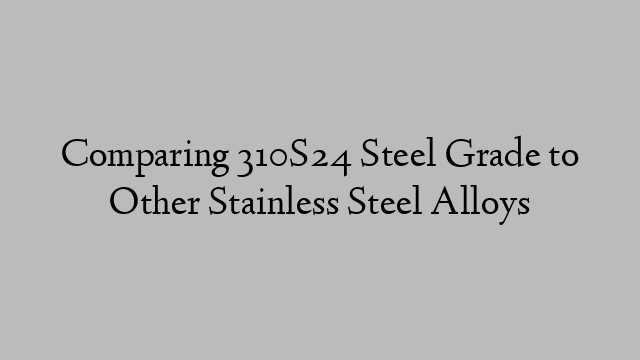Address
304 North Cardinal St.
Dorchester Center, MA 02124
Work Hours
Monday to Friday: 7AM - 7PM
Weekend: 10AM - 5PM
Address
304 North Cardinal St.
Dorchester Center, MA 02124
Work Hours
Monday to Friday: 7AM - 7PM
Weekend: 10AM - 5PM

Stainless steel is a widely used material in various industries, thanks to its corrosion resistance, durability, and ability to withstand high temperatures. With so many different grades of stainless steel available, it can be challenging to determine which one is best suited for a specific application. In this article, we will compare 310S24 steel grade to other stainless steel alloys to help you make an informed decision.
310S24 is an austenitic stainless steel alloy that contains 25% chromium and 20% nickel, making it highly resistant to oxidation and corrosion. It also has a high temperature resistance, making it suitable for use in high-temperature environments such as furnace components, heat exchangers, and exhaust systems.
When comparing 310S24 to other stainless steel alloys, one important factor to consider is its chemical composition. Compared to 304 and 316 stainless steel, 310S24 has a higher chromium and nickel content, giving it superior corrosion resistance and oxidation resistance. This makes it a preferred choice for applications where exposure to high temperatures and corrosive environments is a concern.
Another important factor to consider is the mechanical properties of the alloy. When compared to 304 and 316 stainless steel, 310S24 has a higher tensile and yield strength, as well as a higher resistance to creep and stress rupture at high temperatures. This makes it a suitable choice for applications that require high strength and resistance to thermal cycling.
In addition to its superior chemical and mechanical properties, 310S24 also offers good weldability and formability, making it a versatile choice for a wide range of applications.
However, it is important to consider the cost of 310S24 compared to other stainless steel alloys. Due to its higher chromium and nickel content, 310S24 tends to be more expensive than 304 and 316 stainless steel. While the initial cost may be higher, the superior corrosion and temperature resistance of 310S24 may result in lower maintenance and replacement costs in the long run.
Overall, when comparing 310S24 steel grade to other stainless steel alloys, it is clear that 310S24 offers superior corrosion resistance, high-temperature resistance, and mechanical properties. While it may have a higher initial cost, its long-term performance and durability make it a preferred choice for demanding applications in industries such as petrochemical, chemical processing, and energy production.